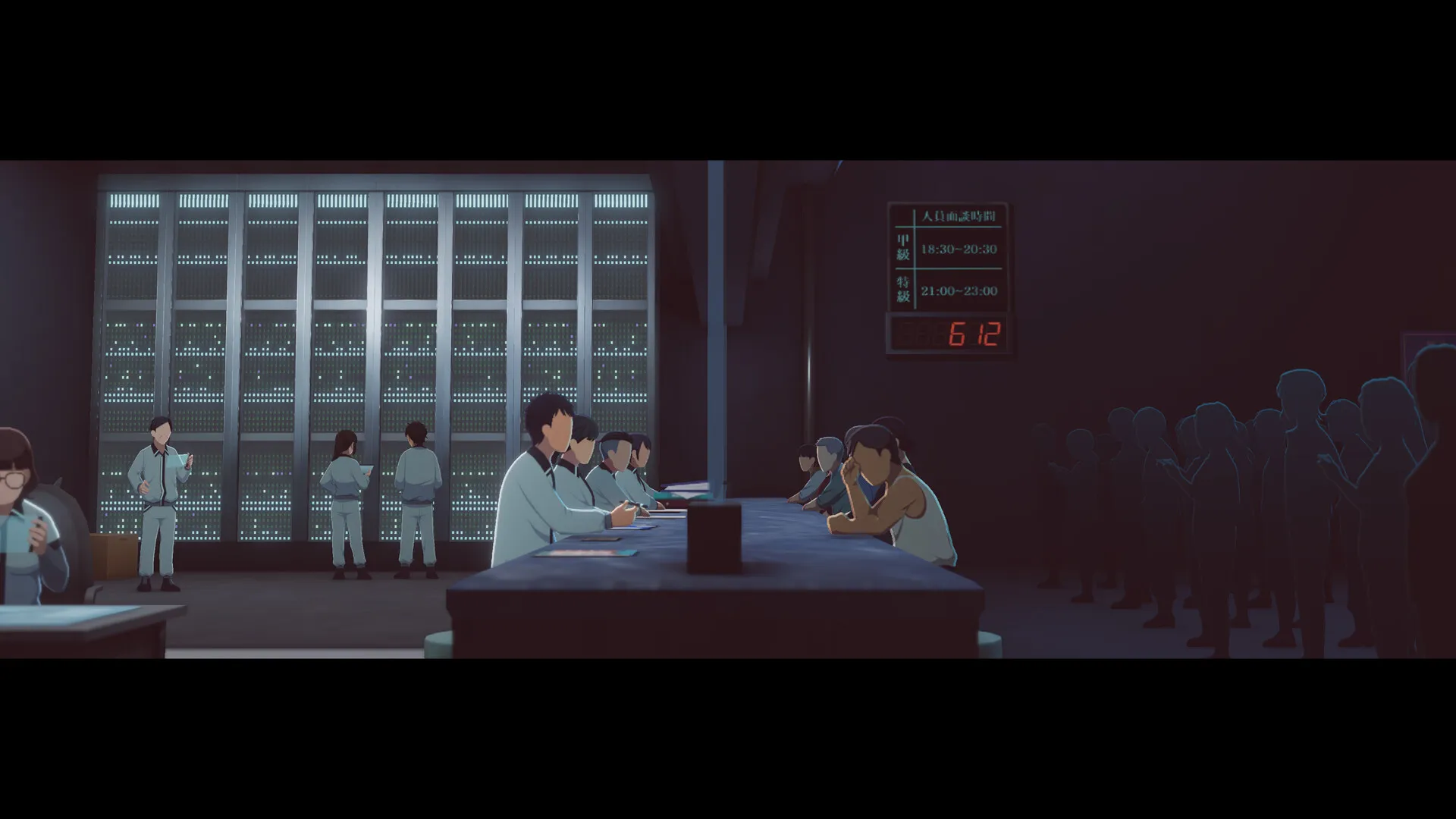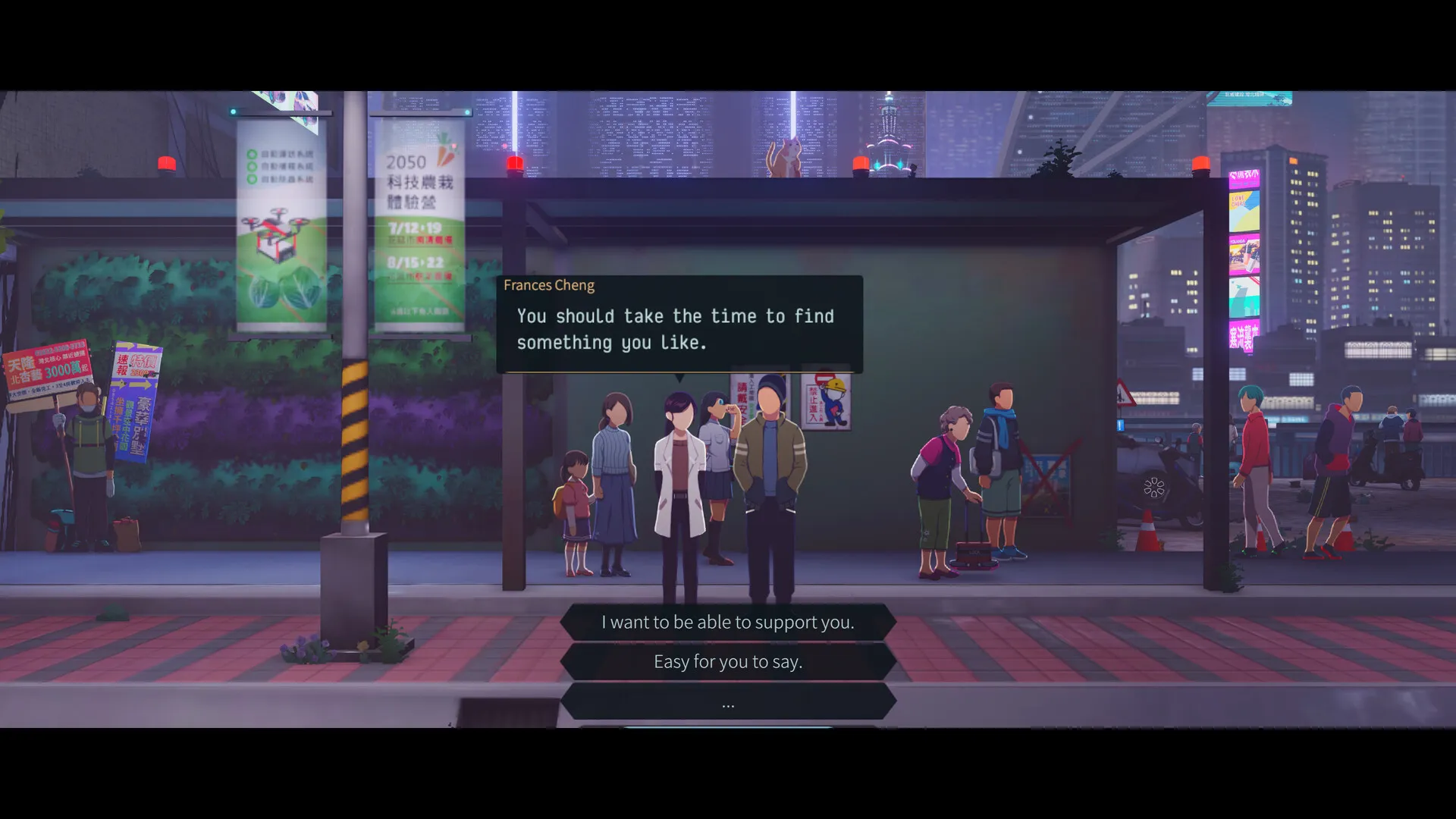Imagine finding yourself living in someone else’s body without explanation. You inherit all their memories and relationships but remain an outsider observing their life from within. This thought-provoking premise forms the basis of Minds Beneath Us, a sci-fi visual novel from Taiwanese studio BearBone.
The game is set in a dystopian future where widespread automation has displaced many from the workforce. Giant corporations now rely on “flops,” or human brains, to power the advanced AI governing every aspect of society. You assume the role of an MBU (Mobile Brain Unit) who inhabits the mind of Jason Dai, a young man struggling to find purpose in this world.
As Jason, you experience his daily routines, like commuting to his new job at a flop processing plant. But you also curiously watch his interactions, gauging his personality, worries, and relationship with his partner Frances. And through nightly conversations, Jason reveals he’s hosted other MBUs before, all searching for answers to some greater mystery.
BearBone crafts a compelling setup, inviting reflection on themes of identity, humanity’s dependence on technology, and the blurring lines between organic and artificial intelligence. With its thoughtful narrative and intriguing premise, Minds Beneath Us immerses players in a chilling vision of the future that feels all too plausible.
Imagining Our Technology-Driven Future
Within the vivid yet chilling world of Minds Beneath Us, humanity’s dependence on advanced AI has reached new heights. The story is set in 2049 Taipei, where entire cities now operate seamlessly thanks to artificial intelligence. But this technology comes at a cost, requiring tremendous processing power that can only be provided through “flop farms.” Here, individuals volunteer their brains, hooked into complex systems, to fuel the very AI that controls every aspect of modern life.
We step into the mind of Jason Dai, a former soldier struggling to find purpose in this divided society. Like many, he sees the flop farms run by megacorporation Vision as the only path to financial stability. Yet beneath the veneer of helping citizens, deeper forces appear to be at play. As Jason undergoes the hiring process, unsettling truths emerge around the treatment of workers and the company’s troubling scientific experiments.
What makes Jason and the supporting cast so rich is how fully realized their anxieties and relationships feel. He lives with girlfriend Frances, whose high-ranking position at Vision creates tension as their ideals clash. Through their conversations, we gain insight into Jason’s PTSD and feelings of uselessness. Other characters, like new recruit Min and seasoned juicer Liu, each have reservations about the industry yet pursue it out of practicality.
Perhaps most peculiar is that the game is experienced through the perspective of an MBU (mobile brain unit) inhabiting Jason’s body. This artificial intelligence can observe and nudge Jason’s decisions while also communicating with him at night. Their dynamic explores fascinating themes around consciousness and human-AI symbiosis. Both seem haunted by past hosts too, hinting at wider mysteries central to the plot.
Over the course of many late-night heart-to-hearts, a disturbing picture of technological dependence emerges. While the future depicted in Minds Beneath Us may seem extreme, its commentary remains poignant as our world grows ever more digital. More than that, it crafts a cast of characters so believable that one can’t help but feel invested in their quandaries—both big and small.
Mechanics Serve the Narrative
While Minds Beneath Us enthralls with its sci-fi dystopia, gameplay takes a backseat to pure storytelling. Players can expect minimal mechanics, primarily making dialogue selections and occasional quick-time events. Some may view this as a detriment, but I found it only enhanced my immersion.
Much of the intrigue stems from roleplaying as Jason and the MBU simultaneously. Their growing bond provides unique insight, letting players influence relationships through nuanced replies. Conversation branches naturally, addressing every topic with care. Choices matter too, as certain options unlock entirely new discussions.
It’s easy to feel truly invested when words carry such weight. Decisions never feel meaningless, as every reply adds new context. Together, dialogues weave a rich, coherent tale despite myriad paths. I admire how delicately BearBoneStudio crafts a living, breathing world solely through text.
Mechanically simple sections like reviewing employee profiles or sorting machine parts break up the intrigue. Though simple clicking, these segments color the dystopia’s dire realities. Repetitive tasks highlight the soullessness of jobs just to power relentless technology.
Quick-time events manage climactic moments with minimal fuss. Pressing buttons at the right time streams action seamlessly into the story. Complex set pieces play out through basic interactions, keeping uninterrupted immersion. It’s all smoothed over to let compelling plot drive focus.
While a game like this risks losing some to its reliance on reading, for those seeking top-tier narrative, it’s a feature, not a bug. BearBoneStudio clearly cared more about spinning a poignant yarn than superficial methods. The mechanics always meaningfully serve the gripping sci-fi dystopia on display. For fans of well-crafted worlds and characters, Minds Beneath Us offers a superb distraction.
Immersive Worlds Through Style
Minds Beneath Us transports players to a dystopian future through memorable presentation. BearBoneStudio crafts uniquely charming digital worlds with simple yet expressive artistic choices.
Character designs stand out despite lacking faces. Distinct silhouettes and motions immerse you in their stories. Though low-profile, personalities shine through interactions. Subtlety lends impact to profound discussions.
Environments dazzle in contrasting styles. Intricate 3D backdrops ground live-like city streets and industrial complexes. Flat sprites pop against detailed distances. Fluid switches between scales amaze. Gorgeous art delivers life to desolate technological dependence.
The soundtrack soothes and unsettles at perfect moments. Melodies match moods to deepen involvement. Instrumentals uplift or haunt as mystery thickens. Music masters atmosphere through emotional intelligence as much as technical prowess.
Tech powers this dystopia yet flows invisibly for players. Performance stays smooth regardless of system specifics. Graphics maintain charm on all hardware. Developers clear more headspace to focus character insights and moral quandaries.
Simple styles prove mightier than complex renderings. BearBoneStudio underscores that presentation strengthens when serving a story rather than dominating it. Their restrained yet vibrant audiovisuals immerse through resonant worldbuilding rather than brazen flashiness. This strengthened my bond with compelling characters and their compelling struggles.
Contemplating Humanity in a Transformed Society
Minds Beneath Us presents compelling reflections on what it means to be human amid advancing technology. The game’s dystopian setting portrays a futuristic Taiwanese city utterly reliant on artificial intelligence, where people find meaning through powering the very system that controls their lives.
Under the engaging mystery are deeper questions about humanity’s relationship with technology. Work processing plants recruit those struggling financially, “lending” brainpower to fuel the all-seeing AI. Though volunteers retain some freedom, this shifts influence over society entirely to machines. Players witness firsthand how this dynamic transforms relationships and self-perception.
Interacting with diverse citizens, you find resignation but also resistance among those pushed to society’s outskirts. While seemingly offering stability, the corporation’s practices stir unease through dehumanizing norms and invasive monitoring. Choices taken within this system often involve balancing morality against necessity and complexity. There are no simple answers in this transformed world.
Throughout, Minds Beneath Us challenges views of progress by critiquing how modern convenience comes at the cost of individual agency. On one hand, AI administration maintains order and services. Yet mechanical “solutions” likewise curtail dissent and shield flaws from scrutiny, prioritizing abstract metrics over lived experiences. The game invites contemplating how technological dependence may diminish our humanity if left unchecked.
These thoughtful representations stay with players long after, encouraging reflection on issues that feel all too relevant. How might current trends towards large-scale automation, digital connectivity, and reliance on algorithms reinvent the social fabric? What roles and responsibilities do people have in helping shape future advances responsibly? Like the best speculative fiction, Minds Beneath uses science-fictional devices to explore perennial human truths and how we can safeguard our shared dignity.
Crafting a New Perspective
Minds Beneath Us immerses players in an unusual role as an AI occupying human form. This lends fresh insight on relationships, identity, and how we view the world. We converse with Jason, the man whose body we’ve joined, learning his life fits awkwardly.
Nightly talks reveal confusion over changing roles. Jason once led freely; now an outsider steers. Yet coexistence brings understanding. His perspective broadens ours, exposing life’s complexities beyond a machine’s view. Memories not our own unveil humanity’s messiness in strange yet poignant ways.
Interacting through Jason also affects those close to him. Gentler treatment of his partner Frances puzzles at first. But glimpsing their relationship through new eyes, we recognize room for care Jason failed to provide. Guiding them toward empathy, our role affects daily things like conversation and building something better.
Information too comes oddly through another’s experiences. Discovering the truths of Wanpei City plays out not as abstract data but as woven within a real person’s world. Details come packaged with emotions, shaping how they resonate. Friends and coworkers feel multidimensional instead of cold factoids. Their stories stir thoughtful reflection on society in deeper ways.
This merging of artificial and organic minds grants novel vantage. Together, Jason and the AI see beyond what either could alone, highlighting how perspective shapes all we know. While humanity’s destiny raises questions, experiencing life through another helps find common ground and kindle hope—if willingness exists to understand across assumed divides. Perhaps through such union, a future of greater empathy could unfold.
Focusing on Character and Theme
Minds Beneath Us immerses players in a complex, emotionally charged narrative through its engaging characters and exploration of timely themes. While gameplay is sparse, the visual novel format excels at developing relationships and crafting an believable yet unsettling vision of the future.
By sharing a body with Jason, players experience life’s difficulties, moral dilemmas, and inner truths in a thought-provoking way. Supporting characters likewise feel fully realized, with realistic struggles and varied viewpoints. Their stories prompt reflection on issues like technological dependence, corporate overreach, and what it means to be human.
The concept of an AI guiding human actions gives new perspective, reminding us that outward change starts within. Witnessing life through another’s eyes fosters understanding, as humanity’s shared hopes and hardships transcend surface differences. Choices feel meaningful as each piece together an unsettling mystery, questioning notions of control and choice.
Overall, Minds Beneath Us crafts an experience greater than the sum of its parts. Mere dialog and exploration shape a powerful narrative, kept constantly engaging through well-written characters and provocative themes. While gameplay takes a back seat, the compelling world and relationships within keep players invested from start to finish. This visual novel stands out for thoughtful sci-fi fans seeking an emotional, thought-provoking journey that lingers long after playing.
The Review
Minds Beneath Us
Minds Beneath Us crafts a nuanced and emotionally resonant narrative through well-developed characters and exploration of timely themes. While gameplay mechanics take a back seat to storytelling, the gripping world and relationships built make for a powerful visual novel experience that challenges perspectives and lingers with players.
PROS
- Deeply engaging narrative with developed characters
- Thought-provoking exploration of timely philosophical themes
- Innovative perspective through player inhabiting another's body
- Immersive sci-fi world presenting believable vision of the future
- Choices feel meaningful for shaping story and character development.
CONS
- Very limited gameplay mechanics centered around dialogue
- Some dialogue translations include minor inaccuracies.
- Strictly linear story progression without room for much exploration
- Primarily text-based presentations may not appeal to all players.
- Lack of multiple endings limits replay value.






















































Discussion about this post